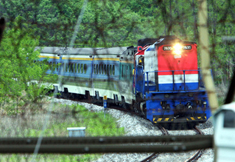 The two Koreas have agreed on the daily schedule for a cross-border freight train that will resume service later this month for the first time in over 50 years, the South Korean Unification Ministry said on Sunday (Dec. 2).
The two Koreas have agreed on the daily schedule for a cross-border freight train that will resume service later this month for the first time in over 50 years, the South Korean Unification Ministry said on Sunday (Dec. 2).
The train will run between the South’s Munsan station and the North’s Bongdong station as a follow-up to the October summit between their leaders in Pyongyang.
The ministry said a freight train will depart from Munsan at 9:00 a.m. each weekday and reach the North Korean border station of Panmun before returning to the South at 2:00 p.m.
The train, which will not operate during weekends, will extend its route to Bongdong once the construction of a cargo-handling facility there is completed, the ministry said. The Bongdong station serves as a gateway to an inter-Korean industrial park in Gaeseong.
The soon-to-be-resumed service is expected to facilitate transportation of raw materials and manufactured goods made in the industrial park, the ministry said.
The 19.8-km route between the two Koreas was severed in the midst of the 1950-53 Korean War and has since remained closed.
The prime ministers of South and North Korea met in Seoul last month and agreed to restart the cross-border cargo railway service and jointly repair the North’s dilapidated roads and railways as a follow-up to reconciliation measures agreed upon by two Koreas’ leaders in early October.
The agreement at the end of three-day (Nov. 14-16) Inter-Korean Prime Ministers’ Talks was aimed at facilitating transportation of personnel and materials from the South to the joint industrial complex in the North’s border city of Gaeseong, where dozens of South Korean firms employ over 20,000 North Korean workers.
The railway renovation and linkage agreement came as South Korea, Russia and China have been discussing ambitious projects to connect the two Koreas’ railway systems to the Trans-Siberian and Trans-China railways so products from South Korea could be transported to Europe at lower costs and in less time.